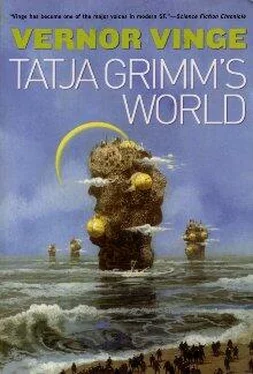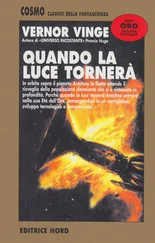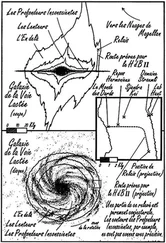A priest shouted at the swordsmen, and the moment passed. They came in from opposite sides, their bladed clubs swinging. The girl grabbed her club at the hilt and foregrip and whirled between them. They were slow, and Tatja Grimm was terribly quick. That could only save her from quick death. She danced backwards, up the rise. She used the club like a staff, blocking. Blade fragments flew from every blow.
She bounded back three great steps, and moved both hands to the hilt of the club. She swung it in a quick sweep, her greater reach keeping the two back—till they separated again and came at her from the sides. Even so, she wasn’t retreating now.
“She learns very fast,” Tredi said to no one in particular.
But some lessons are learned the hard way. The bladed hooks were good for more than terror and disemboweling. One of her parries brought a crashing halt; her club had locked with the attacker’s. The swordsman raised his club, swinging her slender body against him. Tatja kicked and kneed him. Even in his armor, the fellow staggered beneath the blows. The second attacker ran forward, rammed the point of his club squarely at the girl’s torso. Somehow she sensed the attack, and threw herself backwards. The impaling thrust was turned into a deep slash across her chest.
She hit the ground and bounced instantly to her feet. For a moment the action stopped and the antagonists stared at each other, shocked. In the smoky red dimness, details were vague …
yet the fake bosom still seemed to be in place. Everyone could see that the armor around her chest had been slashed open. Everyone could see the ripping wound across her breast. Everyone could see that Hrala did not bleed.
The second swordsman stepped backwards and whimpered. His tiny brain finally realized that he should be terrified. He dropped his club and ran from both priests and Hrala.
The first fellow didn’t seem to notice. He flipped Hrala’s club over his head and advanced on her. She didn’t retreat, didn’t try to rush around him to the discarded clubs; she stood with knees slightly bent, hands held open. Only when the bladed club swung toward her middle did she move—and then it was too fast for Rey to follow. Somehow she caught the foregrip of the club, used it as a brace to swing her body up and ram her foot into the other’s throat. The blow jarred the club loose, and the two fell in an apparently random tangle. But only one combatant rose from that fall. The other lay twitching, the point of a sword-club struck through his skull.
The girl stared at the dying man. A look that might have been horror passed across her face; her arms and shoulders were shaking. Suddenly she straightened and stepped back. When she looked at the priests, haughty pride was back in her features.
“Hrala. Hra-la. Hra La. Hra La…” The chant began again. This time, no priest dared shout it down.
Coronadas Ascuasenya had plenty of contact with the rescued during the next few days. Some recovered from the horror better than others. Janna Kats could laugh with good humor within ten hours of the rescue. The little anthropologist, Tredi Bekjer, was almost as cool, though it would be some time before his body recovered.
But four days out from the village, some of the Science people were still starting at shadows, crying without provocation. And for every survivor, there would always be nightmares.
Cor had never considered herself especially brave, but she hadn’t been trapped in that pit; she hadn’t seen friends tortured and murdered. Once they returned to the barge, and the village was irrevocably behind them, it was easy to put the terror from her mind. She could enjoy the Welcoming Back, the honor given to her and Rey Guille and Brailly Tounse, the greater honor given to Tatja Grimm.
It was as close to an adventure book ending as could be imagined. Thirty-six from the Science had died. But nearly one hundred had survived the adventure and would return with the barge, much to the surprise of their sponsoring universities, who hadn’t expected to see them for two years. When Tarulle sailed into the Osterlais—and later the Tsanarts—everyone would be instant celebrities. It would be the story of the decade, and an immensely profitable affair for the Tarulle Publishing Company. Whatever their normal job slot, every literate participant in the rescue had been ordered to write an account of the operation. There was talk of starting a whole new magazine to report such true adventures.
And management seemed to think that Cor and Rey had masterminded their publishing coup. After all, he had suggested the landing; she had produced Tatja/Hrala. Cor knew how much this bothered Rey. He had tried to convince Svektr Ramsey that he had fallen into things without the least commercial savvy. Of course, Ramsey knew that, but he wasn’t about to let Rey wriggle free. So Guille was stuck with producing the centerpiece account of the rescue.
“Don’t worry about it, Boss. They don’t want the truth.” Cor and the Fantasie editor were standing at the railing of the top editorial deck. Except for the masts and Jespen Tarulle’s penthouse, this was as high as you could get on the barge. It was one of Cor’s favorite places: a third of the barge’s decks were visible from here, and the view of the horizon was not blocked by rigging and sails. It was early and the morning bustle had not begun. A cold salt wind came steadily from the east. That air was so clean; not a trace of tarry smoke. White tops showed across miles of ocean. Nowhere was there any sign of land. It was hard to imagine any place farther from the Village of the Termite People.
Rey didn’t answer immediately. He was watching something on the print deck. He drew his jacket close, and looked at her. “It doesn’t matter. We can write the truth. They won’t understand. Anyone who wasn’t there won’t understand.” Cor had been there. She did understand … but wished she didn’t.
Rey turned back to watch the print deck, and Cor saw the object of his interest: The man wore ordinary fatigues. He wandered slowly along the outer balcony of the deck. He was either lonely, or bored—or fascinated by every detail of the railing and deck. Cor suspected the fellow wasn’t bored: Part of the Hrala fraud had been the demand that the Termiters replace her damaged “property” (the dead from Brailly’s party and the Science ). It seemed unwise to retract the demand completely, so five unfortunate villagers were taken aboard.
This was one of them; he had been a Termiter priest, their spokesman/interpreter. Cor had talked to him several times since the rescue; he made very good copy. He turned out to be a real innocent, not one of the maniacs or hard-core cynics. In fact, he had fallen from favor when the cynics pushed for trial by combat. He had never left the village before; all his Spräk came from reading magazines and talking to travelers. What had first seemed a terrible punishment was now turning out to be the experience of his lifetime. “The guy’s a natural scholar, Boss. We drop the others off at the first hospitable landing, but I hope he wants to stay. If he could learn about civilization, return home in a year or so… He could do his people a lot of good. They’ll need to understand the outside world when the petroleum hunters come.”
Rey wasn’t paying attention. He pointed further down the deck.
It was Tatja Grimm. She was looking across the sea, her tall form slumped so her elbows rested on the railing and her hands cupped her chin. The ex-priest must have seen her at that instant. He came to an abrupt halt, and his whole body seemed to shiver.
“Does he know?”
Rey shook his head. “I think he does now.”
In many ways the girl was different from that night at the village. Her hair was short and red. Without the fake bust, she was a skinny pre-teener—and by her bearing, a discouraged one. But she was nearly six feet tall, and her face was something you would never forget after that night. The priest walked slowly toward her, every step a struggle. His hands grasped the railing like a lifeline.
Читать дальше








